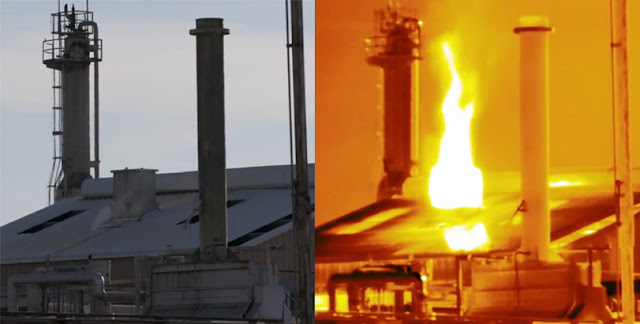 |
| The DCP Pegasus gas plant in Midkiff, Texas, on Nov. 5, shot with a regular camera (left) and with an infrared camera (right) to reveal methane leaks. (Screenshots from NYT video by Jonah Kessel) |
"The study shows that in order for natural gas to be a major component of the nation’s effort to meet greenhouse-gas reduction targets over the coming decade, present methods of controlling methane leakage would have to improve by anywhere from 30 to 90 percent," David Chandler reports for MIT News. "Given current difficulties in monitoring methane, achieving those levels of reduction may be a challenge. Methane is a valuable commodity, and therefore companies producing, storing, and distributing it already have some incentive to minimize its losses. However, despite this, even intentional natural gas venting and flaring (emitting carbon dioxide) continues."
For instance, in February 2018 a hydraulically fractured gas well in eastern Ohio had a massive methane leak that took 20 days to control and put more methane into the atmosphere than all but three European nations emit in one year, Steven Mufson reports for The Washington Post.
Chandler reports, "The study also finds policies that favor moving directly to carbon-free power sources, such as wind, solar, and nuclear, could meet the emissions targets without requiring such improvements in leakage mitigation, even though natural gas use would still be a significant part of the energy mix."
Methane is a potent greenhouse gas that traps far more heat in the atmosphere than carbon dioxide, but dissipates much more quickly. Leaks of it can be difficult to detect and assess because it's colorless. A crew from The New York Times recently videotaped natural gas processing plants with an infrared camera to show the scope of methane leaks (see above).
No comments:
Post a Comment